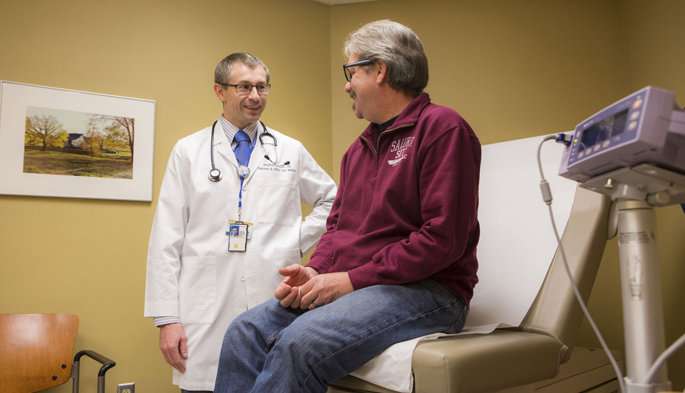Study tracks therapy to slow idiopathic pulmonary fibrosis

Investigators in the Division of Allergy, Pulmonary and Critical Care have launched a pilot study to see if patients with idiopathic pulmonary fibrosis (IPF) can tolerate the addition of a commonly used antiviral drug to standard IPF treatments. The research team believes the drug may ultimately help slow progression of the chronic and progressive disease or reverse its course.
IPF is a type of lung disease affecting 50,000-100,000 people a year that results in scarring (fibrosis) deep within the lungs for an unknown reason. IPF is a form of diffuse lung disease, primarily involving the interstitium, a part of the lungs' anatomic structure. It normally occurs in adults 50 to 70 years old, in more men than women, and particularly in those with a history of cigarette smoking.
For many in the final stages of IPF, lung transplantation remains the only life-saving option, however not everyone is a suitable candidate for transplantation and there is a shortage of suitable donor organs.
Over time, the scarring with IPF gets worse and it becomes hard to take a deep breath because the lungs cannot take in enough oxygen. As the lung tissue thickens, the lungs can't properly move oxygen into the bloodstream and the brain and other organs don't get the oxygen they need.
IPF usually affects middle-age and older adults and there is no cure. There are two medications prescribed to these patients—pirfenidone and nintedanib—which have been shown to slow the speed at which lung function is lost, but they don't improve survival. Many people with IPF live only about three to five years after diagnosis.
"The prognosis is worse than many cancers," said Jonathan Kropski, MD, assistant professor of Medicine and the lead investigator of the study. "Patients with IPF often become progressively more disabled by their lung disease, and on average, they have worse survival than patients with metastatic breast or colon cancer."
Kropski said Vanderbilt investigators have been studying what drives IPF for more than a decade. There are several hundred patients currently seen at Vanderbilt with the disease.
"More than 10 years ago, we identified that in the lungs of almost everyone with IPF, we can detect one of the viruses that causes mononucleosis," Kropski said.
"While those viruses are very common and most people are exposed to them sometime in their life, most have mild symptoms and then carry latent virus for the rest of their life with no problem. In people with IPF, we have found that the virus itself appears to be replicating and potentially causing damage in the injured part of the lung. We know that when there is damage to the lung, the body turns on repair pathways to repair the injury. In some people, the injury continues to occur, leading to the formation of scarring in the lung and the development of IPF.
"That led us to the idea that the virus itself, or the immune response to the virus could be one of the things causing damage to the lung."
Kropski compares the injury to the lung from a chronic viral infection to the way that the chronic hepatitis virus injures the liver, causing liver inflammation and fibrosis. "We think something analogous to that could be going on in the lung," he said.
The Vanderbilt study will look at the antiviral medication valganciclovir, which targets the human herpes viruses, in particular, cytomegalovirus (CMV). It's the medication commonly given organ transplant recipients following transplant to prevent the reactivation of CMV.
"We believe that it will reduce the cycles of injury in the lung and suppress the damaging immune response, which may prevent disease progression or possibly even allow the lung to start to repair itself properly," Kropski said.
Vanderbilt has done prior work in animal models with the genetic risk for pulmonary fibrosis. The research has shown if you take the mouse version of one of the viruses and infect mice, they'll go on to develop worse fibrosis after being infected.
The Vanderbilt study will include 30 patients in its first (pilot) phase, which will make sure individuals can tolerate the drug. Following that, a larger, Phase II, multicenter study is expected to take place.
Enrolled IPF patients who have been previously infected with CMV will be randomized into two groups—those receiving valganciclovir and those given a placebo.
The patients will continue taking any medications they are currently on during the 12-week study. During this time, the research team will monitor changes in the blood immune response to the virus, lung function, oxygen levels and exercise capacity.
"We're hopeful about this study," Kropski said. "What's exciting about this is it's a completely different area from where other IPF trials have focused. Most of the current studies and many of the medications previously investigated for treating IPF target the end stage of the disease. They don't really target what's driving the disease, what's getting it going.
"We're hopeful by targeting a much more upstream point in the disease that there will be the potential for more effective treatments that might allow the lung to repair itself properly. Nothing has been shown to do that so far."















